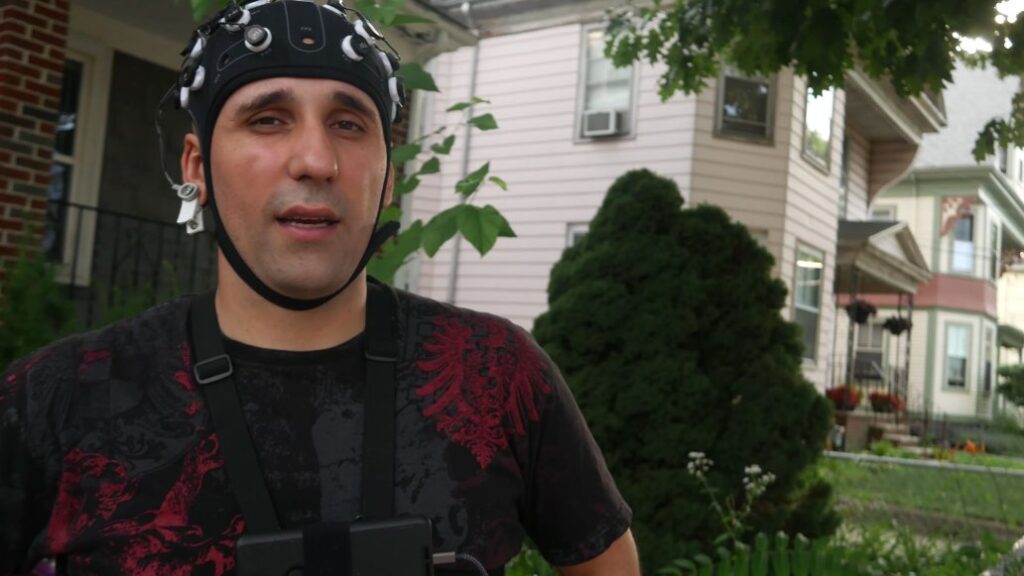I came across this wearable technology that is being developed by a scientist by the name of Neo Mohsenvand. His goal is to help those with brain difficulties be able to store memories, specifically with Alzheimer’s Disease in mind. With a camera on his chest and his sporty EEG cap, he records himself everyday and analyzes his physiological signals. In the future, this innovation can help those with severe chronic memory weakness be able to retain more, though it does require collecting an incredible amount of personal data. A quote in the Data Colonization reading that caught my attention was, “A continuously trackable life is a dispossessed life, no matter how one looks at it.” The authors also state that the very integrity of human life needs to be protected with all this data collecting. Obviously, the authors of this piece and Mohsenvand have opposing views on this issue. I would like to know what are your takes on this EEG Cap, considering that those who would be using it in the future may not be the ones signing the consent forms for it because of their compromised mental capacity.

Neo with the EEG Cap and Camera




Technology like this can have an issue under the idea of whether it is considered ethical to place a device like such into a person’s brain. The people in need of such a device may not consent to the device being young or considered inability to make proper decisions. The device will also record the good and the bad, and I am unsure if people want to remember the bad. Remembering the good will bring happiness; remember the bad will make triggers into something worse.
As wearing the device on the outside of the body and have the ability to take it off and see in what situations the person did well in and enjoyed, I will consider that idea as being okay because it is not a permanent implant in which the holder has no control over.
This is so fascinating! Thank you for sharing, I don’t now how I feel about it. Did Mohsenvand create this EEG Cap? If he did and his data is only being collected by him for him (assuming he is on a closed protected circuit) , then I think that goes against what “data colonization” and therefore his life is not dispossessed. This also reminds me of the cyborg vs tryborg discussion, where this technology might be great for those with memory impairments that might need it, does using this technology just for “fun” some how potentially hurt the people that need it. I have also been doing some reading/ listening to podcasts on memories. From my understanding, it is believed that long term memories are formed through repetition, repetitive communication by the neurons transmitting the information of those memories. With this EEG Cap recalling those memories for us, does our own biological recollection of memories diminish because it is not being relied upon to do so? For those without memory impairment, don’t we already have this form of self-tracking built into our bodies?
Wow, this is fascinating, thanks so much for sharing. It almost feels like journaling but taken to the extreme. I’ve never done that myself, but I know a lot of people who do say that being able to revisit the things that happened to them that day can be a great way of processing their experiences and just generally alleviating stress/getting their thoughts in order. As for the potential uses when it comes to people suffering from Alzheimer’s Disease, I’m thinking about some of the readings we did for Monday’s class, where the authors warn of the unintended consequences of even well-meaning technological developments. We know so little (in the grand scheme of things) about this illness (and the brain in general), I’d be worried about potential adverse effects (especially when we start talking about actually wiring this type of technology into the brain). I know when my grandad was suffering from Alzheimer’s Disease, he would get very upset at not being able to remember things, even when someone was there to remind him of them (in fact, that would frustrate him more, because it made him realize he couldn’t remember certain things). I therefore don’t know how helpful it would have been for him to access archive footage of the things he was trying to remember (the best technique, we found, was to only talk about things that happened a long time ago, and let him lead the conversation in the direction he wanted to, so he could focus on the things he remembered).
I think the concept of data colonialism is intended to apply to data that is appropriated for profit or value. If the data produced by this EEG cap remains the private property of the individual (or the family), then I don’t see any conflict. If the company that makes the product sells user data, then there is the potential for a “data relation” that might be exploitative or underhanded.
I believe that since the 70s there have been groups of scientists and technological developers who oppose the use of technology and science, exclusively for economic reasons. For example, the members of Radical Technologies in England, between the early 70s and the mid-80s, achieved several advances in political and administrative terms, however, systematically the power has been organized to nullify or block these types of people do. or organizations. The problem is not the technology, but what we do with it.
I think that it’s interesting to consider the video blog and monitoring as an extension of memory. Here he’s made a digital repository for his life. However, I don’t know that it would be all that useful for Alzheimer’s patients. They are already confused by their environment, and having trouble categorizing people and their functionality and relationship to themselves. Adding data isn’t necessarily going to clear that up, even if it includes reminders of who people are and prior context.
I can only wonder if these “memories” will eventually be used as criminal evidence. While I’m incredibly sensitive to the needs of Alzheimer’s patients and their families (two of my grandparents had the disease for over a decade) and to a range of people with memory issues, it does seem as if this intervention would require third-party mediation, access, and maintenance, which, which gets incredibly ethically tricky of the users themselves are cognitively compromised.
I agree with what Catherine and Stephanie said. I do not think that this will be very useful for Alzheimer’s patients, although it is a heartbreaking disease for those who suffer from it and the caregivers.
In terms of the technology itself, I have two opinions. First, I believe that it can be powerful for people to go back to their memories and see their lives (if they have many good things to remember daily). In my case, I love watching old photographs and videos of myself, and I would love to be able to see more. On the other hand, I think it could be disruptive to people’s lives to remember everything lived. I think there is a reason we forget certain things and not others. Plus, I think that human experience is not about what is happening to us but about how we perceive what is happening to us.
I have to admit I don’t have much knowledge of the effects of Alzheimer’s and recommended treatments, but I have to agree with a few others who mentioned it might not be too harmful IF the recorded content is only being used by that person. But I’m not sure how realistic this is when a person is often working with a caretaker or family member and revealing this kind of personal information might be traumatic. While it’s not a company that’s making a profit off of these memories they are making a profit off of those who purchase the technology. Therefore I don’t think that’s a perfect example of data colonialism, but happy to be swayed otherwise. Maybe it’s the watcher of the memories that becomes the colonizer if that’s not only the person wearing it.
I also wonder if anyone who wears this might get confused and wonder WHY they’re wearing it and what it is. This might be stress inducing. I’m not sure I would feel comfortable wearing this equipment all the time. Not to mention remembering to put it on in the morning.
Technology is crazy! I agree with those that said that the application of this specific technology to those with Alzheimer’s can enter some serious ethical gray areas.
Kelly’s point about its use as criminal evidence is interesting and makes me consider that this is true for anyone that is self-quantifying or overly documenting their life. How long until we have a vlogger that self-incriminates?